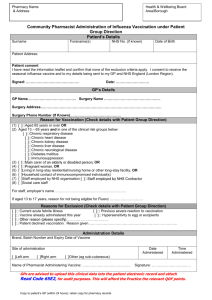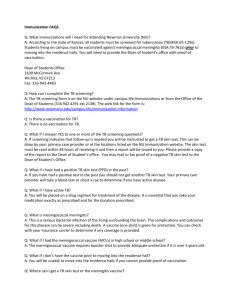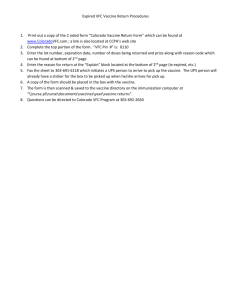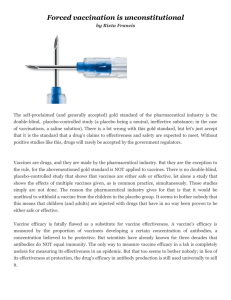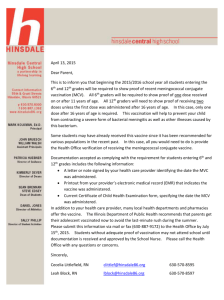Meningococcal Vaccines press release_sept2015
advertisement
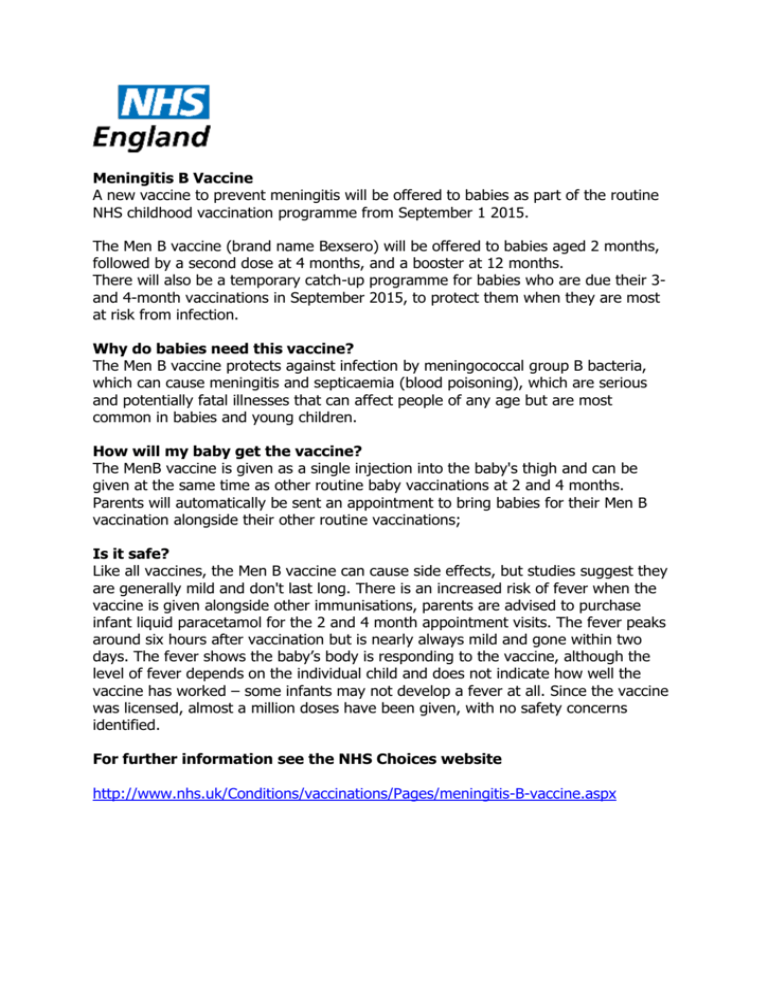
Meningitis B Vaccine A new vaccine to prevent meningitis will be offered to babies as part of the routine NHS childhood vaccination programme from September 1 2015. The Men B vaccine (brand name Bexsero) will be offered to babies aged 2 months, followed by a second dose at 4 months, and a booster at 12 months. There will also be a temporary catch-up programme for babies who are due their 3and 4-month vaccinations in September 2015, to protect them when they are most at risk from infection. Why do babies need this vaccine? The Men B vaccine protects against infection by meningococcal group B bacteria, which can cause meningitis and septicaemia (blood poisoning), which are serious and potentially fatal illnesses that can affect people of any age but are most common in babies and young children. How will my baby get the vaccine? The MenB vaccine is given as a single injection into the baby's thigh and can be given at the same time as other routine baby vaccinations at 2 and 4 months. Parents will automatically be sent an appointment to bring babies for their Men B vaccination alongside their other routine vaccinations; Is it safe? Like all vaccines, the Men B vaccine can cause side effects, but studies suggest they are generally mild and don't last long. There is an increased risk of fever when the vaccine is given alongside other immunisations, parents are advised to purchase infant liquid paracetamol for the 2 and 4 month appointment visits. The fever peaks around six hours after vaccination but is nearly always mild and gone within two days. The fever shows the baby’s body is responding to the vaccine, although the level of fever depends on the individual child and does not indicate how well the vaccine has worked – some infants may not develop a fever at all. Since the vaccine was licensed, almost a million doses have been given, with no safety concerns identified. For further information see the NHS Choices website http://www.nhs.uk/Conditions/vaccinations/Pages/meningitis-B-vaccine.aspx MenACWY Vaccine Teenagers and university students are to be offered a vaccination to prevent meningitis W disease. The Men ACWY vaccine is given by a single injection into the upper arm. There are two Men ACWY vaccines that will be used in the vaccination programme, called Nimenrix and Menveo. They are very similar and both work equally well Why do young people need this vaccine? Cases of meningitis and septicaemia (blood poisoning) caused by Men W bacteria are rising, due to a particularly deadly strain. Older teenagers and university students are at high risk of infection because they tend to live in close contact in shared accommodation, such as university halls of residence. Who will be offered the vaccine? Teenagers - From August 2015, all 17- and 18-year-olds in school year 13 as part of the NHS vaccination programme. The Men ACWY vaccine protects against four different causes of meningitis and septicaemia – meningococcal (Men) A, C, W and Y diseases. GP practices will automatically send letters inviting teenagers in school year 13 to have the Men ACWY vaccine. There will also be a school-based catch-up vaccination programme for current school year 10 students from January 2016. The Men ACWY vaccine will also be added to the routine adolescent schools programme (school year 9 or 10) in the Autumn, alongside the routine 3-in-1 tetanus, diptheria and tetanus booster as a direct replacement for the Men C vaccination. University Students - First-time university students up to the age of 25 will also be offered the Men ACWY vaccine, fist-time students can take up the offer of the vaccination when offered by their GP from August 2015, before starting university. If they are unable to take up the offer before starting University, first time students who have moved away from their previous area of residence can register with a new GP at the beginning of the new academic term and request the MenACWY. For further information see the NHS Choices website http://www.nhs.uk/Conditions/vaccinations/Pages/3-in-1-teenage-booster.aspx



